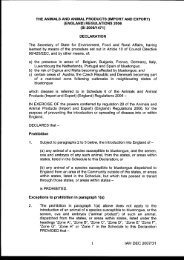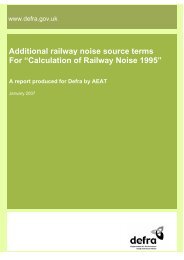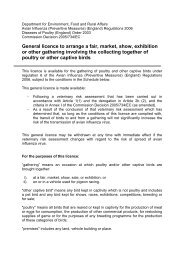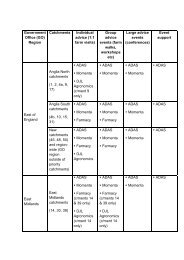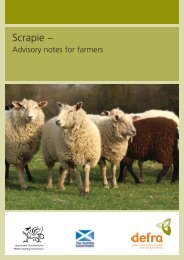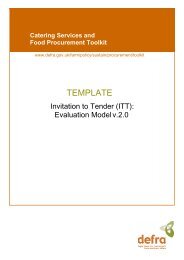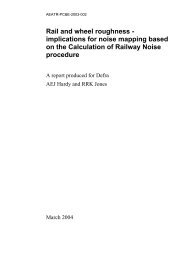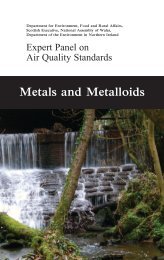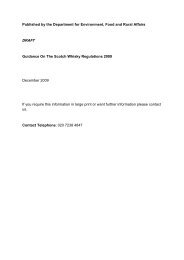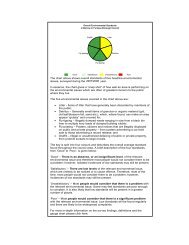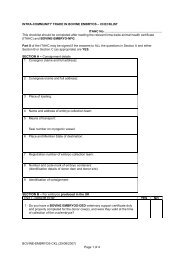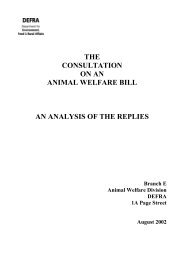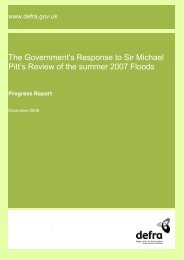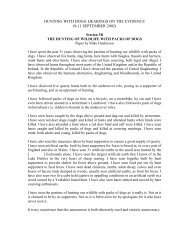Review of the Food-borne Zoonoses Research ... - ARCHIVE: Defra
Review of the Food-borne Zoonoses Research ... - ARCHIVE: Defra
Review of the Food-borne Zoonoses Research ... - ARCHIVE: Defra
You also want an ePaper? Increase the reach of your titles
YUMPU automatically turns print PDFs into web optimized ePapers that Google loves.
Project code: OZ0707<br />
Project title: Identification <strong>of</strong> factors mediating intestinal<br />
colonisation <strong>of</strong> cattle by enterohaemorrhagic<br />
Escherichia coli O157:H7.<br />
Start date (dd/mm/yy): 01/10/1999<br />
End date (dd/mm/yy): 11/04/2007<br />
£603,124<br />
Total cost:<br />
Affiliation: Institute for Animal Health, Compton.<br />
Sub-contractor(s): None<br />
Abstract <strong>of</strong> research<br />
Enterohaemorrhagic Escherichia coli (EHEC) comprise a group <strong>of</strong> zoonotic diarrhoeal<br />
pathogens <strong>of</strong> worldwide importance. Human infections are frequently caused by direct or<br />
indirect contact with ruminant faeces and may be complicated by haemorrhagic colitis<br />
and life-threatening renal and neurological sequelae. Strategies to reduce <strong>the</strong> prevalence<br />
<strong>of</strong> EHEC in ruminants are predicted to lower <strong>the</strong> incidence <strong>of</strong> human infections; however<br />
<strong>the</strong> molecular mechanisms influencing intestinal colonisation <strong>of</strong> food-producing hosts by<br />
EHEC are ill-defined. <strong>Defra</strong>-funded research conducted under project OZ0707 aimed to<br />
understand this process in greater detail and to exploit <strong>the</strong> knowledge to develop, test<br />
and refine novel methods <strong>of</strong> disease control. The research involved <strong>the</strong> most<br />
comprehensive survey for EHEC virulence factors performed to date and yielded<br />
valuable insights that could not have been obtained in surrogate rodent or cell-based<br />
assays. The project involved targeted and genome-wide mutagenesis <strong>of</strong> E. coli O157:H7<br />
and analysis <strong>of</strong> wild-type and mutant strains in vitro and in bovine oral challenge, ligated<br />
intestinal loop and ex vivo organ culture assays. The information led to <strong>the</strong> testing <strong>of</strong><br />
several subunit vaccines in cattle and has been disseminated via numerous high-impact<br />
publications, review articles and invited lectures.<br />
<strong>Review</strong> Summary<br />
This research has contributed to <strong>the</strong> evidence base for VTEC O157 and to <strong>the</strong><br />
development <strong>of</strong> improved methods <strong>of</strong> control. The study provided baseline data on <strong>the</strong><br />
mechanisms <strong>of</strong> colonization in cattle with E. coli O157 and showed that it might be<br />
difficult to develop functional vaccines. The work was carried out to a high scientific<br />
standard and resulted in several publications in high-impact journals.<br />
Major colonization factors <strong>of</strong> E. coli O157 were identified but vaccination studies with<br />
purified antigen indicated, however, that colonization was not inhibited even in <strong>the</strong><br />
presence <strong>of</strong> high-titre antibodies against <strong>the</strong>se adhesion factors. The results indicated<br />
that <strong>the</strong> way forward may be to construct non-pathogenic probiotic strains that might<br />
occupy <strong>the</strong> niche which is currently used by pathogenic E. coli O157.<br />
99



